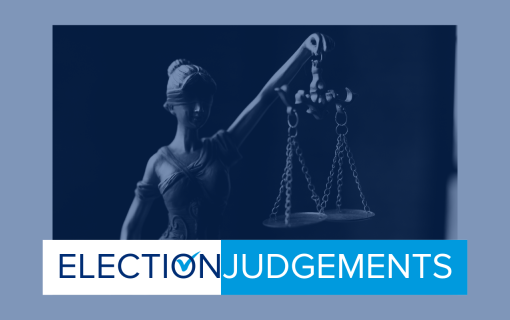Q&A with IFES Consultant Carlos Hinojosa: Living Proof that “No One Ever Leaves IFES”
Carlos Hinojosa joined the International Foundation for Electoral Systems (IFES) in 2002, supporting rule of law efforts on a number of regional research projects. He quickly developed interest in IFES’ technical assistance to election management bodies and became a Program Assistant for Asia and the Americas, participating in the design, management and implementation of programs. In 2008, he took on the responsibility to manage the Latin America division. He became a consultant in 2009, and now assists IFES with the implementation of programs with the State Elections Commission of Puerto Rico.
How did you get into the field of elections?
My very first experience in this field of work started during my early years in law school. I had a part-time internship drafting resolutions for one of the magistrates at the local electoral tribunal. I didn’t really think that elections would be part of my professional career for a long time after that. After spending years as a public servant overseeing administrative procedures and human rights cases at the mayor’s office and practicing law in the corporate world, I arrived in Washington, D.C. Before I had unpacked my bags, I met a guy who was moving next door. We talked about our backgrounds and he invited me to have a chat in his office at IFES, he was the IFES Regional Director for Latin America and the Caribbean, Patricio Gajardo, a good friend now. At first, I was interested in discovering how democracy and the rule of law coexist and are intertwined and required to safeguard the rights of the people. The mechanics of the electoral process is so complex that it immediately drew my attention. I have been working on elections most of my time since then. In a short period of time, my interest for elections became a passion.
What is the most exciting project you worked on during your time at IFES? Can you describe what made it interesting for you?
It’s hard to say really, all the work I did had its own level of excitement. I remember with joy some of the work we did in Nicaragua. I remember participating in poll worker training seminars in areas that were so remote and underdeveloped that made the experience unforgettable. I remember the interest, eagerness and hope the people demonstrated when our team would arrive at the training location. I have a wonderful memory of an elderly woman who cried in happiness when she obtained her voter ID for the very first time. I can’t forget, of course, having my clipboard being stolen by spider monkeys. I also remember sitting down with members of advocacy groups to discuss possible ways and technologies to increase participation of persons with disabilities in Puerto Rico or Afro-Ecuadorians in Guayaquil. It is so exciting to hear the needs of the people and participate in brainstorming in search of viable solutions. Interacting directly with people yearning to participate in the political process has been one of the most rewarding professional experiences. It is always exciting to meet and work with the best technical experts in the world.
Did you feel that your work at IFES helped you grow professionally? Which IFES experience (technical or other) do you value the most?
Absolutely. I now have a wider vision and understanding of how democracy works, what it means and how hard you have to work to get there. I value the opportunity and exposure I had learning about real problems and creating and implementing viable projects to support citizens’ participation and the respect and protection of the fundamental rights.
What have you been doing since you left IFES?
Actually, I haven’t left IFES. When I first arrived at IFES, someone told jokingly “no one ever leaves IFES.” Well, it turns out it is true. I left the D.C. office in 2009, and a few weeks later became a consultant. I continue to assist IFES on a part-time basis in the implementation of programs with the State Elections Commission of Puerto Rico. I completed a master’s degree in human rights and democracy at the Latin American Faculty of Social Sciences (FLACSO) in Mexico and continue to work and advise on legal matters.
Based on your experience on the management of democracy and governance programs, what are the greatest challenges for democracy and governance projects?
The crisis of political representation is one the principal challenges for democracy and governance in our days. I think this misrepresentation happens at the institutional and process levels. It creates a disconnect between the people and political elites. It even generates mistrust in institutions. Ideally, in order to develop, finance and implement projects capable of addressing the needs of all citizens, programs and ideas would be generated from within, and not be hard-pressed by international donors’ agendas or as part of a broader spectrum of governance ideals. Technology has transformed the way civil society participates in political processes and has created new avenues for dialogue, but we are yet to see consistency of both working in unison. I have seen several projects that are created to address and cover certain gaps but that were never designed to be sustainable or cohesive with other projects supported by different donors and implemented by different organizations. There is still much to learn and even more work ahead.









